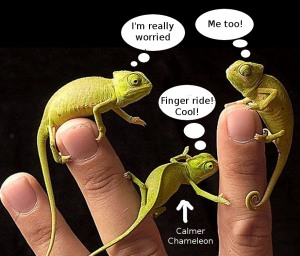The Chameleon Effect: Maintaining Authenticity While Adapting

I see being a chameleon as someone who cares enough to adapt to others communication style, to read the temperature of a meeting, for example and change to be able to resolve issues, make people feel comfortable and so on. It doesn’t necessarily mean changing who you are but being socially and/or politically savvy to understand that we need to be flexible – Roz Usheroff
The title to the introduction of my book The Future of You: Creating Your Enduring Brand is Before We start, Remember . . . To Thine Own Self Be True!
This is a principle that I have, over the years, written and talked about at length for good reason. Beliefs or “perceptions of self” determine your values and ultimately the goals you both set and work toward achieving in terms of your future success.
It all seems pretty straightforward, yet oftentimes it is not. Somewhere in the hustle and bustle of everyday life, we mistakenly confuse being adaptable to surrendering our own beliefs and values as a means of fitting in.
The problem as described above arises when we deal in absolutes, or attempt to define ourselves and the world in which we live and work in terms of being either black or white.
In this context recognizing, as the old saying goes, that there are always three sides to every story or position, is good advice.
Another challenge presents itself when we lose sight of our motives.
The Difference Between Reasons and Motives
In her January 2015 Harvard Business Review article The Authenticity Paradox, professor and author Herminia Ibarra provided a number of examples as to why leaders today “struggle with authenticity.”
As a case in point, she writes about George, a Malaysian executive in an auto parts company who, after his company was acquired by a large multinational corporation, bristled at his new boss’ suggestion that “he needed to sell his ideas and accomplishments more aggressively.” Not being comfortable with this approach, George felt he was being put in the position of having to choose between “being a failure and being a fake.”
Talk about a black and white view of a situation.
The real question George’s story raises is simply this; does the ability and/or willingness to adapt ourselves like a chameleon, to a changing environment, mean that we have to compromise our personal values or beliefs?
In other words, when we are required to do something that makes us feel uncomfortable or forces us outside of our comfort zone, do we automatically sacrifice our authenticity if we comply?
Confronting this question represents the fork in the road between reasons and motives.
George no doubt had very good reasons for not wanting to follow his new boss’ direction. Prior to it’s acquisition, his old company “valued a clear chain of command and made decisions by consensus.” In other words, there was no need for promoting oneself as every decision was reached by way of a collaborative team effort. George was comfortable with this approach.
However with his new company, “George found himself working with peers who saw decision making as a freewheeling contest for the best-debated ideas.” Individualism and intrapreneurship were both encouraged and rewarded. This was something with which George was both unfamiliar and uncomfortable.
Based on his personal view, in resisting his boss’ direction George was taking the road of reasons, and in the process lost site of the motives for why he was there in the first place.
This is an important distinction in that our focus should be on the motives for why we do what we do, and the desired outcomes we want to achieve.
For example, a friend of mine does not always like going to the gym 3 times a week, but he does enjoy the benefits of being healthy and having more energy. His motives are to live a better and healthier life.
Given his busy schedule and the fact that he is often tired at the end of the day, he would no doubt have what many would consider to be good reasons for not going to the gym. But if those reasons prevent him from achieving his end goal, even if they have a degree of legitimacy, they ultimately undermine as opposed to strengthening him.
Or to put it another way, authenticity is not based on only doing those things with which we are most comfortable or enjoy doing. Authenticity is remaining true to your motives or intent while working towards a worthy and honorable goal, that serves the best interests of others as well as your own.
Does this mean that George has to overnight become a whirlwind of self-promoting energy, shedding any remnants of discomfort with stepping into the spotlight? No.
What it does mean is that instead of finding reasons not to do something, George should assess his actions in the context of his original motives for doing what he does.
If his motives are based upon helping his company to succeed and in the process develop into the best executive he can be, then by becoming intrapreneurial, he is actually maintaining his authenticity.
Conversely, and by choosing the road of reasons i.e. I have never worked like this in the past or we have never done things this way, represents more of an excuse than it does a stance.
Have you ever encountered the fork in the road between your reasons for not doing something and the motives that drive you towards your desired outcomes or goals?
What did you do? Which road did you take?
30
Tags: adapting, authenticity, chameleon, Herminia Ibarra, The Authenticity Paradox





Reason vs. motive. Great article Roz. Similarly, I have been asked when employees are challenged to communicate differently than they like, aren’t they being asked to change their values? And I say ” you have a voice you use when a child is getting ready to cross a busy street, and a voice you use when sitting next to a grieving friend at a funeral.” As you change your voice, adapt to new challenges, act in new ways with new expectations strengthens your learning and tests your abilities! No one should be asked to changes their values, rather you grow and learn and values like motives evolve. Good for Growth! Thanks Roz